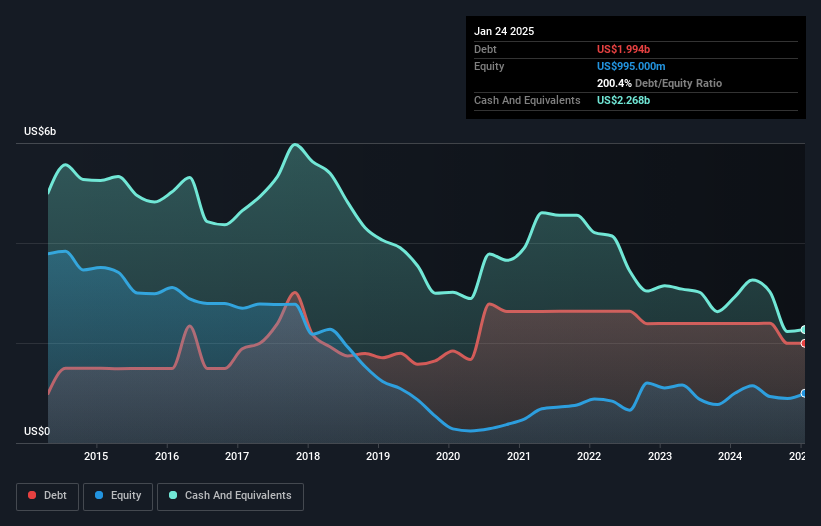
David Iben put it well when he said, 'Volatility is not a risk we care about. What we care about is avoiding the permanent loss of capital.' It's only natural to consider a company's balance sheet when you examine how risky it is, since debt is often involved when a business collapses. Importantly, NetApp, Inc. (NASDAQ:NTAP) does carry debt. But is this debt a concern to shareholders?
We check all companies for important risks. See what we found for NetApp in our free report.When Is Debt Dangerous?
Debt assists a business until the business has trouble paying it off, either with new capital or with free cash flow. Ultimately, if the company can't fulfill its legal obligations to repay debt, shareholders could walk away with nothing. However, a more usual (but still expensive) situation is where a company must dilute shareholders at a cheap share price simply to get debt under control. Of course, debt can be an important tool in businesses, particularly capital heavy businesses. The first thing to do when considering how much debt a business uses is to look at its cash and debt together.
What Is NetApp's Debt?
The image below, which you can click on for greater detail, shows that NetApp had debt of US$1.99b at the end of January 2025, a reduction from US$2.39b over a year. However, it does have US$2.27b in cash offsetting this, leading to net cash of US$274.0m.

How Healthy Is NetApp's Balance Sheet?
We can see from the most recent balance sheet that NetApp had liabilities of US$4.20b falling due within a year, and liabilities of US$3.80b due beyond that. On the other hand, it had cash of US$2.27b and US$898.0m worth of receivables due within a year. So it has liabilities totalling US$4.83b more than its cash and near-term receivables, combined.
While this might seem like a lot, it is not so bad since NetApp has a huge market capitalization of US$16.8b, and so it could probably strengthen its balance sheet by raising capital if it needed to. However, it is still worthwhile taking a close look at its ability to pay off debt. Despite its noteworthy liabilities, NetApp boasts net cash, so it's fair to say it does not have a heavy debt load!
Check out our latest analysis for NetApp
Also good is that NetApp grew its EBIT at 14% over the last year, further increasing its ability to manage debt. There's no doubt that we learn most about debt from the balance sheet. But it is future earnings, more than anything, that will determine NetApp's ability to maintain a healthy balance sheet going forward. So if you want to see what the professionals think, you might find this free report on analyst profit forecasts to be interesting.
But our final consideration is also important, because a company cannot pay debt with paper profits; it needs cold hard cash. NetApp may have net cash on the balance sheet, but it is still interesting to look at how well the business converts its earnings before interest and tax (EBIT) to free cash flow, because that will influence both its need for, and its capacity to manage debt. During the last three years, NetApp generated free cash flow amounting to a very robust 91% of its EBIT, more than we'd expect. That positions it well to pay down debt if desirable to do so.
Summing Up
Although NetApp's balance sheet isn't particularly strong, due to the total liabilities, it is clearly positive to see that it has net cash of US$274.0m. And it impressed us with free cash flow of US$1.3b, being 91% of its EBIT. So we don't think NetApp's use of debt is risky. Another factor that would give us confidence in NetApp would be if insiders have been buying shares: if you're conscious of that signal too, you can find out instantly by clicking this link.
If you're interested in investing in businesses that can grow profits without the burden of debt, then check out this free list of growing businesses that have net cash on the balance sheet.
Have feedback on this article? Concerned about the content? Get in touch with us directly. Alternatively, email editorial-team (at) simplywallst.com.
This article by Simply Wall St is general in nature. We provide commentary based on historical data and analyst forecasts only using an unbiased methodology and our articles are not intended to be financial advice. It does not constitute a recommendation to buy or sell any stock, and does not take account of your objectives, or your financial situation. We aim to bring you long-term focused analysis driven by fundamental data. Note that our analysis may not factor in the latest price-sensitive company announcements or qualitative material. Simply Wall St has no position in any stocks mentioned.